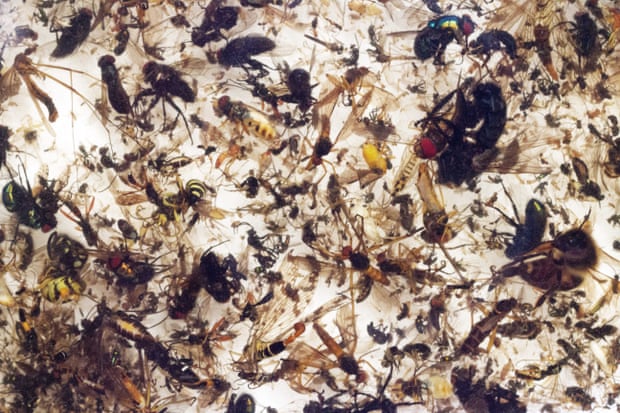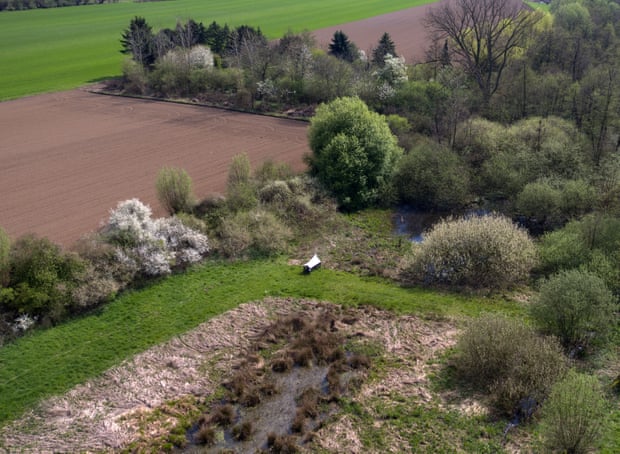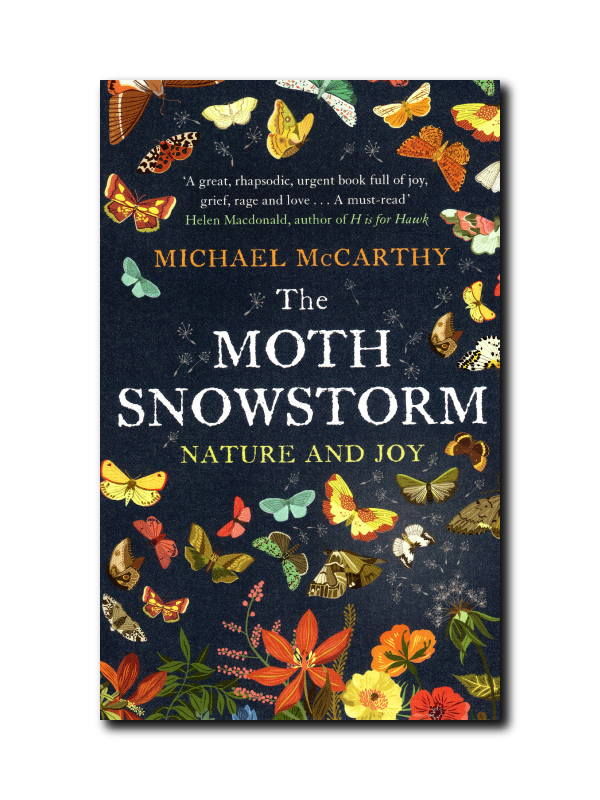http://news.nationalgeographic.com/news/2005/09/0920_050920_extinct_insects.htmlMass Extinction of Insects May Be Occurring Undetected
September 20, 2005
The term "endangered species" typically conjures up images of charismatic animals—tigers, pandas, orangutans, whales, condors. But a new study says that the vast majority of species on the verge of extinction is in fact humble insects.
The study estimates that up to 44,000 bugs of all varieties could have been wiped off the face of the Earth during the last 600 years. And hundreds of thousands more insect species could be lost over the next 50 years.
Only about 70 insect extinctions have been documented since the 15th century, possibly because many insects have been poorly studied.
"Most extinctions estimated to have occurred in the historical past, or predicted to occur in the future, are of insects," argues entomologist Robert R. Dunn of North Carolina State University in Raleigh.
The finding is significant, because insects play vital roles in plant pollination, decomposition, and soil processing. They also form essential links in ecological chains as plant-eaters, predators, and parasites.
The loss of keystone insect species—those on which a large number of other species depend—could be especially detrimental for ecosystems and people.
Multitude of Missing Species
"Most entomologists I know have some species they haven't seen in years, but [they don't] have the time or money to look for them," said Dunn, who reports his findings in the current issue of the journal Conservation Biology.
"It wouldn't be hard to come up with a list, for example, of 50 ant species in the Americas that haven't been seen for 50 years—many in urban areas that used to be wild," he said.
Insects make up 80 percent of all known animal species. Though only 900,000 insects have been identified, experts agree that there are still vast numbers of undocumented species. Estimates vary, but some researchers believe that as many as 2 to 100 million insect species could exist.
To estimate how many insects may have become extinct in recent history, Dunn first looked at figures for well-documented birds and mammals. He found that, over the last 600 years, 129 bird species have gone extinct, or 1.3 percent of all existing bird species.
Dunn then assumed that 3.4 million insect species live on Earth. If insects go extinct at a similar rate as birds do, then about 44,000 species could have disappeared over the same time period.
Few of these extinctions are documented because insects in general are poorly studied, Dunn notes. In addition, insects are small and difficult to find, making it difficult to confirm whether species have vanished for good.
In some cases it's even difficult to demonstrate that larger species are totally extinct, said entomologist Jeff Boettner of the University of Massachusetts at Amherst. For example, Boettner points to the ongoing controversy over the recently rediscovered ivory-billed woodpecker (Campephilus principalis).
"It might not be so easy to confirm that birds are extinct, let alone insects, when we don't even know about the status of one of the largest woodpeckers in the U.S.," he said.
Most of the 70-odd insect extinctions that have been officially recorded are of charismatic species, such as butterflies, or from small habitats that could be exhaustively searched, such as the Hawaiian islands, or from parts of the world that have been extensively studied, such as the United States.
Disappearing Act
Some insects may be lost in ways that aren't considered for larger species.
For example, research suggests that many insects have narrower geographic ranges than larger animals and plants, meaning that it is much easier to totally obliterate the habitats these insects need to survive.
One extinct species of insect, the Rocky Mountain locust (Melanoplus spretus), was once so numerous that in the 1800s it was described as the single largest barrier to westward expansion in the U.S., Dunn says.
The locusts migrated by the millions between breeding and feeding grounds. Their swarms averaged six feet (two meters) high and hundreds of feet (tens of meters) across.
But the bug's breeding ground was a small, restricted type of floodplain habitat. Destruction of these habitats to create new cattle pasture was enough to drive the species to extinction by the turn of the 20th century.
Another way insects may be lost is through a process known as co-extinction, Dunn said. Many insects go extinct when species they rely on disappear. Most fish, birds, lizards, and other animals have their own specialized mites and lice, so when the host species die, their parasites die with them.
Also, plant-eating insects are likely to go extinct when the plants they feed on die. A massive population decline in chestnut trees due to chestnut blight in the 20th century took at least three species of butterfly with it.
Boettner agrees that co-extinction could be a major factor. "In ecology you rarely lose one thing. For every species of mammal, bird, plant, insect, and so on, there are at least two species of parasites that specialize on them as hosts."
Similarly, losing some species of insects could have surprising effects for people.
One 1997 study estimates that a third of world crop production depends on pollination by wild insects. Without these bugs in the ecosystem, an estimated 117 billion dollars (U.S.) worth of crops would fail.
However, "many insects, just like many vertebrates, don't have a role that we would miss if they were to go extinct," Dunn noted. "For these species, the reason for conservation cannot simply be utilitarian, just as it is not for many vertebrates."
"We conserve tigers and pandas because we value them culturally and aesthetically, and because it seems wrong to let them go extinct due to solely human factors," he said.





 (When I moved to a rural area in the late 1980's, I reluctantly learned to cohabitate w/many insects; I later learned to respect, appreciate and even revere bugs, through a little boy who was a city-dweller & budding entomologist.)
(When I moved to a rural area in the late 1980's, I reluctantly learned to cohabitate w/many insects; I later learned to respect, appreciate and even revere bugs, through a little boy who was a city-dweller & budding entomologist.)